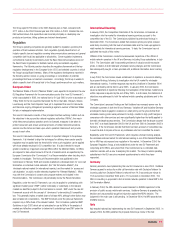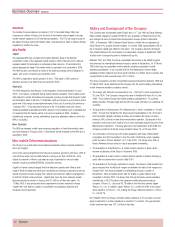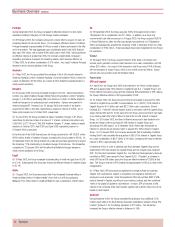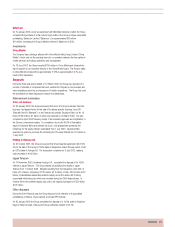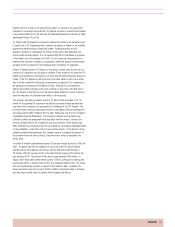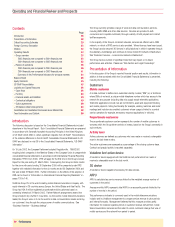Vodafone 2005 Annual Report Download - page 29
Download and view the complete annual report
Please find page 29 of the 2005 Vodafone annual report below. You can navigate through the pages in the report by either clicking on the pages listed below, or by using the keyword search tool below to find specific information within the annual report.
Business |27
Regime) which is contrary to EU law and thus invalid. In summary, it is argued that
imposition of corporation tax under the CFC Regime amounts to unlawful discrimination
or an unlawful restriction on the exercise of fundamental freedoms under the EU Treaty
(particularly Articles 43 and 56).
On 3 May 2005 the Special Commissioners referred the matter to the European Court
of Justice (the “ECJ”) requesting that a number of questions in relation to the invalidity
argument be determined as a preliminary matter. Pending resolution of such
questions, Vodafone 2’s application for closure of the enquiry (and, effectively, the
enquiry itself) has been stayed. It is not expected that the ECJ will deliver a judgment
in this matter until, at the earliest, mid 2006. The ECJ does not have jurisdiction to
determine the outcome of Vodafone 2’s application rather the Special Commissioners
will apply the ECJ’s judgment to the particular facts of Vodafone 2’s application.
If the ECJ decides that the CFC Regime in its entirety is invalid under EU law, then no
charge to UK corporation tax can arise to Vodafone 2 with respect to VIL under the CFC
Regime and the Special Commissioners will order that the Inland Revenue’s enquiry be
closed. If the CFC Regime is held by the ECJ to be valid, either in part or as a whole,
then it will be a matter for the Special Commissioners to apply the ECJ’s reasoning to
the particular circumstances of Vodafone 2’s case. Although it is not possible to
address all possible outcomes under such a scenario, it should be noted that even if
the CFC Regime is held by the ECJ to be entirely lawful, Vodafone 2 would continue to
resist the imposition of corporation tax liability on other grounds.
The Company has taken provisions, which at 31 March 2005 amounted to £1,757
million, for the potential UK corporation tax liability and related interest expense that
may arise if the Company is not successful in its challenge of the CFC Regime. The
provisions relate to the accounting period which is the subject of the proceedings and
accounting periods after 31 March 2001 to date. Please see note 8 to the Company’s
Consolidated Financial Statements. The Company considers these provisions are
sufficient to settle any assessments that may arise from the enquiry. However, the
amount ultimately paid by the Company (if any) upon resolution of the enquiry may
differ materially from the amount accrued and, therefore, could have a significant effect
on the profitability or cash flows of the Group in future periods. In the absence of any
material unexpected developments, the Company expects to reassess the amount of
this provision when the views of the ECJ become known, which is expected to be
during 2006.
A number of Vodafone subsidiaries acquired 3G licences through auctions in 2000 and
2001. An appeal was filed by Vodafone UK, along with other UK mobile network
operators which were granted a 3G licence, with the VAT and Duties Tribunal on
18 October 2003 for recovery of VAT on the basis that the amount of the licence fee
was inclusive of VAT. The amount of this claim is approximately £888 million. In
August 2004, these claims were referred, jointly, to the ECJ although no hearing date
has yet been listed. A decision from the ECJ is not expected before 2006. The Group
has not recognised any amounts in respect of this matter to date. In addition, the
Group has made a claim for recovery of VAT in relation to 3G licence fees in Portugal
and may pursue similar claims in certain other European jurisdictions.


